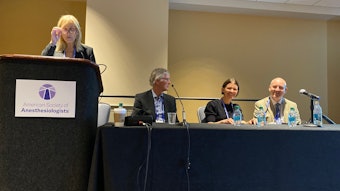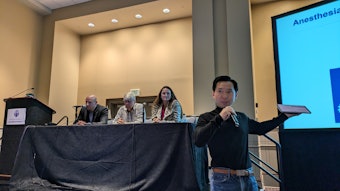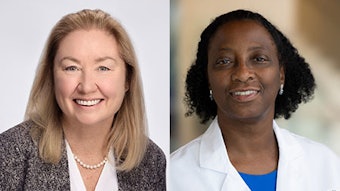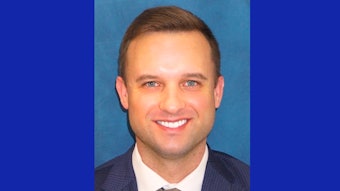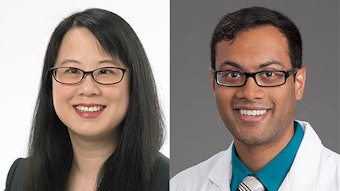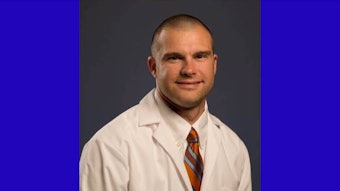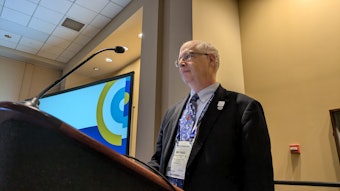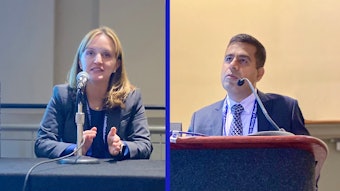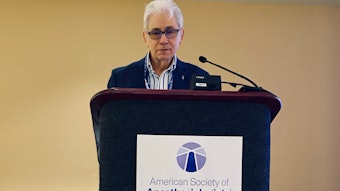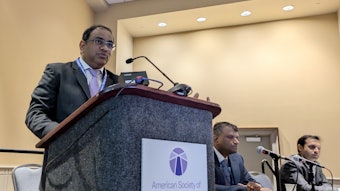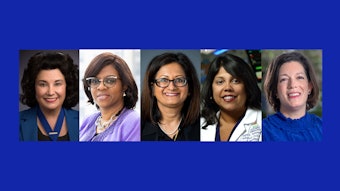With all due respect
Rovenstine Memorial lecturer shares personal insight from research and past events to advance the future of medicine.
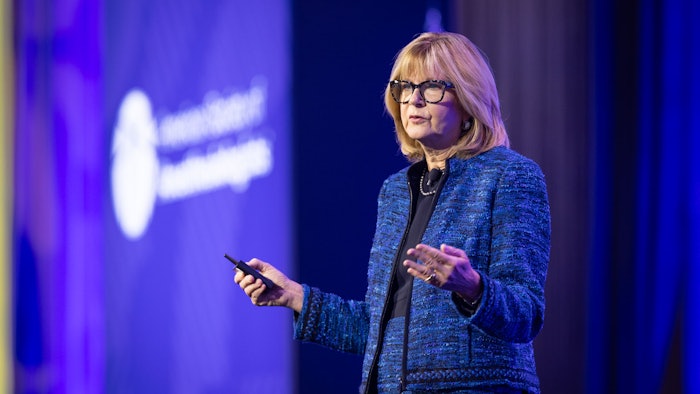
Trauma and loss are not easy to talk about, but they are events from which we must learn. This, in addition to the acknowledgment of and admiration for anesthesiologists (and medicine in general), was at the heart of the 2024 Emery A. Rovenstine Memorial Lecture.
Mary Dale Peterson, MD, MSHCA, FACHE, FASA, Executive Vice President and Chief Operating Officer of Driscoll Children’s Health System in Corpus Christi, Texas, was ASA President when the COVID-19 pandemic emerged, and the world as we knew it suddenly came to a halt. She became the society’s courageous leader, served on the White House COVID-19 Task Force, and created the ASA COVID-19 Council.
It was her first-hand experience and journey, alongside her colleagues, community, and country, that influenced her lecture topic, “Our Finest Hour: How Anesthesiologists Saved Countless Lives During the COVID-19 Pandemic.”
COVID-19 killed 7.3 million people worldwide, and more than 1 million people in the United States alone. And while the effects of the pandemic linger, it was the future that Dr. Peterson most wanted to reflect on. That’s not to say she didn’t pay due respect to all those on the front lines.
“I thank you for the lives we saved then and the lives we’ll save in the future by the knowledge we gained,” she said.
Emergencies come in all sorts of shapes and sizes, but there are five basic stages that make up an emergent event, said Dr. Peterson. These are prevention, mitigation, preparedness, response, and recovery. Depending on where individuals resided when the force of the pandemic struck, people landed in various stages. For instance, some communities still had a small window to prevent a further outbreak, while others found themselves in need of an immediate response.
“Our priorities were to prevent loss of life first and secure property second,” she said.
It was in the midst of the pandemic that Dr. Peterson said she saw three main areas to prioritize and address: physicians, patients, and pennies. Although patients may seem like the initial first choice, what many people overlooked, she said, was that physicians couldn’t help others if they weren’t helping themselves.
“This illustrates a principle that I think will be useful in the future: to protect our people,” she said. “If we’re sick, we can’t help. It’s similar to the airline rule of putting your mask on first.”
She led ASA’s charge by ensuring her voice was heard. When White House Task Force discussions got heated, she spoke up on the critical shortage of ventilators. The next thing she knew, Washington, D.C., was calling her and relying on ASA to provide training on how to convert anesthesia gas machines into COVID-19 ICU ventilators. She mentioned how this one action led to the creation of 80,000 extra ventilators.
Dr. Peterson stressed the importance of learning from mistakes and research to advance medicine and prepare for future crises. Without dedicated researchers, generous governmental and philanthropic funding, and collaborative relationships, she said the COVID-19 vaccine would not have been developed.
“The story of the mRNA vaccine is fascinating, and this research will open a new age of medical miracles,” she said. “While the public worried that the new technology was rushed and unsafe, the truth is that this was 40 years in the making.”
In fact, Dr. Peterson said roughly 90% of the COVID vaccines that made it to trials used technology that could be traced back to the prototypes used in HIV trials. Further, she spoke of Katalin Karikó, PhD (a Hungarian who emigrated to the U.S. and landed at Temple University in Philadelphia) and Drew Weissman, MD, PhD, who are responsible for figuring out how to reduce the body’s immune response to mRNA.
Drs. Karikó and Weissman’s findings were rejected initially, but their innovation was instrumental in the formation of companies like Moderna and BioNTech, she said. Their determination to uncover something once thought impossible helped scientists find the vaccine for COVID-19 in an astoundingly small amount of time.
“These rabbit holes and dead ends have begotten an explosion of technologies for a new golden age of medicine,” said Dr. Peterson.
The success of the mRNA technology will carry over into the development of additional lifesaving vaccines for conditions such as cancer, melanoma, sickle cell disease, and amyloidosis – a personal connection for Dr. Peterson, who lost a good friend from the rare disease.
Again, Dr. Peterson reiterated the importance of understanding the past in order to improve the future. This process includes internally and externally recognizing the repercussions of the event and the personal effects it had – and continues to have – on those at the frontlines.
“We are still seeing the aftermath of the COVID-19 pandemic, with staffing shortages due to the accelerated rate of retirements and burnout, all while our aging population needs more health care services,” said Dr. Peterson. “It’s important for us to realize that crisis care affects the mental health of those providing it. We need to pay more attention to the caregivers.”
Dr. Peterson shared a study published earlier this year that surveyed providers and found that more than 18% reported symptoms consistent with post-traumatic stress disorder (PTSD), of which roughly 16% were anesthesiologists. Hospitals, health systems, associations, and leaders, she said, must do more in terms of providing tangible support.
“What is trauma-informed leadership?” she asked. “If I had to sum it up, it is simply asking, listening, and caring for the people you work with.” Physicians want to be heard, protected, prepared, supported, and, ultimately, cared for at the core, she added.
There is much work to be done, like making sure plans, procedures, and policies are in place for the next emergency, especially cybersecurity breaches, which have become all too common in health care and beyond, Dr. Peterson said.
“It’s about planting seeds; only some will germinate and grow, and a few more will produce fruit. It is up to us, as a society and professional organization, to plant seeds, fertilize, and water them,” she said. “… Just like in our anesthesia training, preparing for the worst can help us remain calm and focused in the event of a crisis. It will also help us save lives.”
Dr. Peterson assured the audience that there is so much to be proud of, and she encouraged attendees to celebrate their accomplishments then, now, and going forward.
“I want to thank all of you who took care of your patients regardless of the personal risks involved. I want to thank the researchers who persevered in finding the best treatments and vaccines. Were there people who died because of a lack of resources we would ordinarily have? Yes. But realize, you all did your best under difficult circumstances. That is why we call it crisis levels of care,” she said. “We all lost a friend, a colleague, a family member, or a patient to COVID. We can honor them by continuing our work to advance and advocate for science, educate the public and the next generation of anesthesiologists, and provide leadership in our communities in planning for future disasters.”
